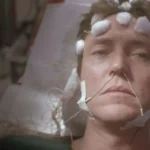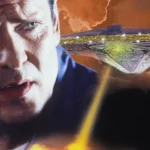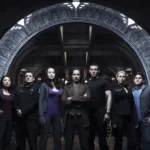THE MACHINE. Intimate science fiction drawing heavily from “Ghost in the Shell” and “Blade Runner”
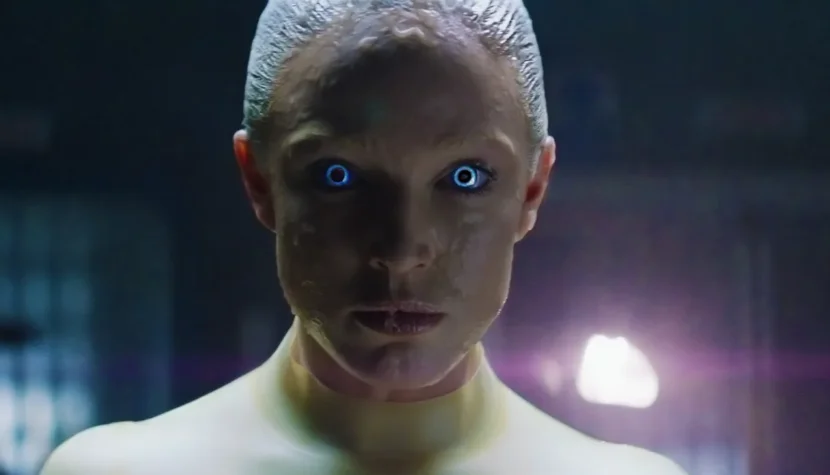
The famous Ghost in the Shell by Mamoru Oshii opens with a scene depicting the birth of a cyborg, incredibly detailed and suggestive, accompanied by Kenji Kawai’s musical backdrop, transforming into something downright mystical. Until the very end, we don’t part ways with a sense of almost spiritual experience, which is a significant paradox if we consider this masterpiece only in the context of futuristic action cinema. Fortunately, Oshii’s film excels practically on every level, serving the audience as the most perfect attempt to glimpse into the titular ghost in the shell since Ridley Scott’s Blade Runner, offering a chance to understand where the boundary between humanity and its absence lies in a machine that looks like a human. Caradog W. James’s film, with the telling title The Machine, draws heavily from these classics, proposing a more intimate story while desperately trying to break free from the constraints of a small budget.
In an undefined future, the view and atmosphere of the Cold War between China and the West, as indicated at the beginning of the film, are not witnessed. Instead, we land in a military research facility in England, where injured soldiers try to regain what they lost on the battlefield. Thanks to brain implants, they can function quite well, although, alongside the loss of speech, there are other, more drastic side effects – in the prologue, an unstable soldier kills several people before succumbing to bullets. What’s to blame? The implant or the human? Perhaps the brain was already damaged to the point where even a computer couldn’t fill in what was lost. Or maybe it did, but mechanically, inhumanly, reducing human capabilities to a series of learned reactions and impulses.
Vincent (played well by Toby Stephens), a brilliant programmer, grapples with this problem. He sees a chance to save his fatally ill daughter in the solution. However, as long as incidents like the one mentioned above occur, he cannot fully trust past successes. This changes when he encounters Ava (uneven but impressive Caity Lotz), who is working on the development of artificial intelligence. Thanks to her program, the machine thinks more “humanly,” quickly assimilating acquired knowledge and learning from mistakes. Soon, the consciousness created by Ava is transferred into the body of a cyborg with a girl’s face, initially as innocent as a child. Vincent imparts knowledge about what it means to be human.

James’s film largely focuses on the protagonist’s inner conflict, wanting to see traces of humanity in the titular machine but still doubting, despite efforts from both the creation and the creator. These efforts mainly boil down to the education given to the cyborg – what is good and what is bad, how to recognize an object and how only its image, and the consequences of everything being paid for by the Ministry of Defense. The military is not particularly interested in constructing a thinking being like a human, only as a soldier, active in combat and passive in every other field. We’ve seen this many times in cinema (most recently with the new version of Robocop), so we can expect further development of the plot – the machine learns to kill but, having internalized values taught by Vincent, a semblance of conscience awakens. Almost immediately, this is equated with humanity. However, the main character continues to wonder if looking at Ava’s replica, he sees a conglomerate of learned behaviors or a truly free entity.
Related:
It’s challenging to call The Machine original, although individual elements of the film have their unique character. The way the cyborg’s body reacts by emitting red light from its interior or the incomprehensible communication between people with implants indicates a world concept not fully utilized due to a lack of an adequate budget. Hence, the confinement of almost the entire story within the walls of one building not only gives a sense of dealing with a low-budget film (which was not a problem for the equally modest Moon) but also introduces a certain genre dissonance. Cyberpunk themes are usually set in a city-megalopolis, full of technological novelties, simultaneously dirty, alive, and on the verge of exhaustion. Without this background of interaction with the external world, the usefulness of the titular entity is reduced to physical efficiency in combat, which the army is interested in (it’s hard to believe that cyborgs can only do that). Instead, we get a military base somewhere in the wilderness and a series of shots of an English village with its typical ugly weather. The future world has never seemed so distant as in England.
Nevertheless, James’s work defends itself. It doesn’t try to imitate its more famous predecessors, although the initial test conversation with a soldier brings to mind Blade Runner’s prologue, and the creation of the cyborg strikes a similarity to the described scene from Ghost in the Shell. The Machine finds its own style for the theme developed by Scott and Oshii, serving more as a preview of the worlds they described than a vision of similar caliber. The execution deserves special praise – both good special effects and decent cinematography, attempting to disguise the small budget (oh, that lens flare), along with excellent electronic music, contribute to creating an atmosphere much better suited to the story than the setting.
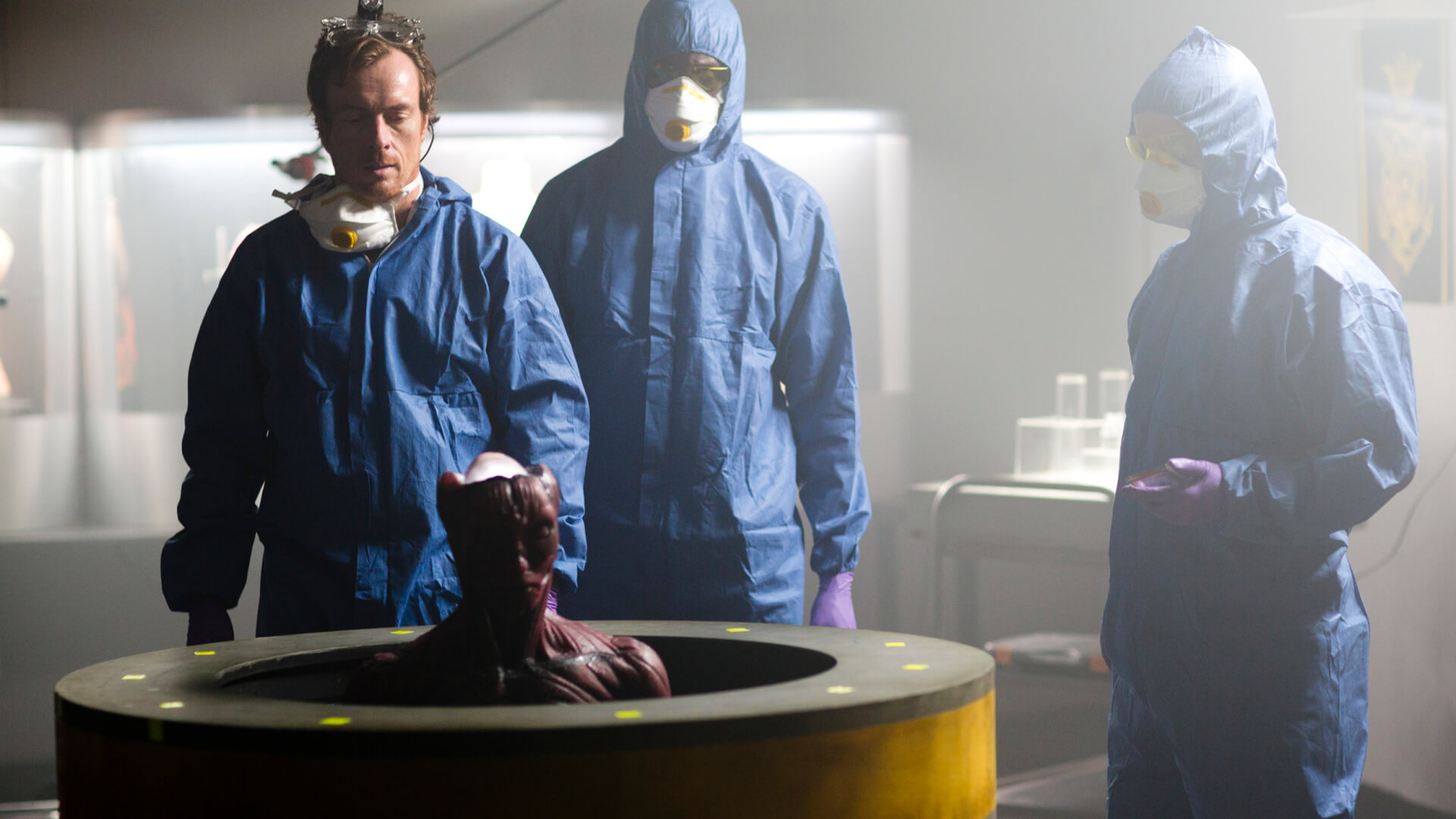
The Machine has spirit, even if finding it in Ava’s copy is problematic. It mainly focuses on dialogues between characters, supplemented by action scenes in the finale. It doesn’t say anything new about the humanity of machines, but it also doesn’t say anything foolish – it dresses a familiar theme in new (seemingly from another era) clothes, emphasizing the interactions between the two main characters, skillfully avoiding an easy romantic subplot. Let’s not deceive ourselves; Lotz, playing the dual role, is as beautiful as a picture, whether she portrays a human or a robot, and in cinema, the difference between the two often seems insignificant. Fortunately, in this case, it is a secondary matter.
PS. The trailer suggests a more aggressive film in which the machine rebels against its creator. Please believe me, it’s not that kind of movie.


